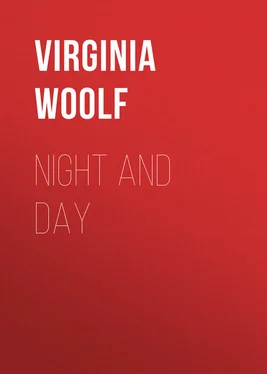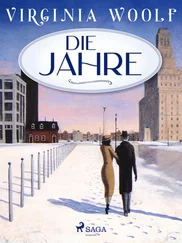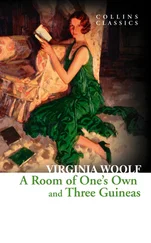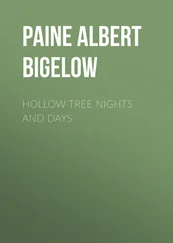Virginia Woolf - Night and Day
Здесь есть возможность читать онлайн «Virginia Woolf - Night and Day» — ознакомительный отрывок электронной книги совершенно бесплатно, а после прочтения отрывка купить полную версию. В некоторых случаях можно слушать аудио, скачать через торрент в формате fb2 и присутствует краткое содержание. Жанр: literature_20, foreign_prose, Зарубежные любовные романы, на английском языке. Описание произведения, (предисловие) а так же отзывы посетителей доступны на портале библиотеки ЛибКат.
- Название:Night and Day
- Автор:
- Жанр:
- Год:неизвестен
- ISBN:нет данных
- Рейтинг книги:3 / 5. Голосов: 1
-
Избранное:Добавить в избранное
- Отзывы:
-
Ваша оценка:
- 60
- 1
- 2
- 3
- 4
- 5
Night and Day: краткое содержание, описание и аннотация
Предлагаем к чтению аннотацию, описание, краткое содержание или предисловие (зависит от того, что написал сам автор книги «Night and Day»). Если вы не нашли необходимую информацию о книге — напишите в комментариях, мы постараемся отыскать её.
Night and Day — читать онлайн ознакомительный отрывок
Ниже представлен текст книги, разбитый по страницам. Система сохранения места последней прочитанной страницы, позволяет с удобством читать онлайн бесплатно книгу «Night and Day», без необходимости каждый раз заново искать на чём Вы остановились. Поставьте закладку, и сможете в любой момент перейти на страницу, на которой закончили чтение.
Интервал:
Закладка:
He went up a great many flights of stairs, and he noticed, as he had very seldom noticed, how the carpet became steadily shabbier, until it ceased altogether, how the walls were discolored, sometimes by cascades of damp, and sometimes by the outlines of picture-frames since removed, how the paper flapped loose at the corners, and a great flake of plaster had fallen from the ceiling. The room itself was a cheerless one to return to at this inauspicious hour. A flattened sofa would, later in the evening, become a bed; one of the tables concealed a washing apparatus; his clothes and boots were disagreeably mixed with books which bore the gilt of college arms; and, for decoration, there hung upon the wall photographs of bridges and cathedrals and large, unprepossessing groups of insufficiently clothed young men, sitting in rows one above another upon stone steps. There was a look of meanness and shabbiness in the furniture and curtains, and nowhere any sign of luxury or even of a cultivated taste, unless the cheap classics in the book-case were a sign of an effort in that direction. The only object that threw any light upon the character of the room’s owner was a large perch, placed in the window to catch the air and sun, upon which a tame and, apparently, decrepit rook hopped dryly from side to side. The bird, encouraged by a scratch behind the ear, settled upon Denham’s shoulder. He lit his gas-fire and settled down in gloomy patience to await his dinner. After sitting thus for some minutes a small girl popped her head in to say,
“Mother says, aren’t you coming down, Ralph? Uncle Joseph – ”
“They’re to bring my dinner up here,” said Ralph, peremptorily; whereupon she vanished, leaving the door ajar in her haste to be gone. After Denham had waited some minutes, in the course of which neither he nor the rook took their eyes off the fire, he muttered a curse, ran downstairs, intercepted the parlor-maid, and cut himself a slice of bread and cold meat. As he did so, the dining-room door sprang open, a voice exclaimed “Ralph!” but Ralph paid no attention to the voice, and made off upstairs with his plate. He set it down in a chair opposite him, and ate with a ferocity that was due partly to anger and partly to hunger. His mother, then, was determined not to respect his wishes; he was a person of no importance in his own family; he was sent for and treated as a child. He reflected, with a growing sense of injury, that almost every one of his actions since opening the door of his room had been won from the grasp of the family system. By rights, he should have been sitting downstairs in the drawing-room describing his afternoon’s adventures, or listening to the afternoon’s adventures of other people; the room itself, the gas-fire, the arm-chair – all had been fought for; the wretched bird, with half its feathers out and one leg lamed by a cat, had been rescued under protest; but what his family most resented, he reflected, was his wish for privacy. To dine alone, or to sit alone after dinner, was flat rebellion, to be fought with every weapon of underhand stealth or of open appeal. Which did he dislike most – deception or tears? But, at any rate, they could not rob him of his thoughts; they could not make him say where he had been or whom he had seen. That was his own affair; that, indeed, was a step entirely in the right direction, and, lighting his pipe, and cutting up the remains of his meal for the benefit of the rook, Ralph calmed his rather excessive irritation and settled down to think over his prospects.
This particular afternoon was a step in the right direction, because it was part of his plan to get to know people beyond the family circuit, just as it was part of his plan to learn German this autumn, and to review legal books for Mr. Hilbery’s “Critical Review.” He had always made plans since he was a small boy; for poverty, and the fact that he was the eldest son of a large family, had given him the habit of thinking of spring and summer, autumn and winter, as so many stages in a prolonged campaign. Although he was still under thirty, this forecasting habit had marked two semicircular lines above his eyebrows, which threatened, at this moment, to crease into their wonted shapes. But instead of settling down to think, he rose, took a small piece of cardboard marked in large letters with the word OUT, and hung it upon the handle of his door. This done, he sharpened a pencil, lit a reading-lamp and opened his book. But still he hesitated to take his seat. He scratched the rook, he walked to the window; he parted the curtains, and looked down upon the city which lay, hazily luminous, beneath him. He looked across the vapors in the direction of Chelsea; looked fixedly for a moment, and then returned to his chair. But the whole thickness of some learned counsel’s treatise upon Torts did not screen him satisfactorily. Through the pages he saw a drawing-room, very empty and spacious; he heard low voices, he saw women’s figures, he could even smell the scent of the cedar log which flamed in the grate. His mind relaxed its tension, and seemed to be giving out now what it had taken in unconsciously at the time. He could remember Mr. Fortescue’s exact words, and the rolling emphasis with which he delivered them, and he began to repeat what Mr. Fortescue had said, in Mr. Fortescue’s own manner, about Manchester. His mind then began to wander about the house, and he wondered whether there were other rooms like the drawing-room, and he thought, inconsequently, how beautiful the bathroom must be, and how leisurely it was – the life of these well-kept people, who were, no doubt, still sitting in the same room, only they had changed their clothes, and little Mr. Anning was there, and the aunt who would mind if the glass of her father’s picture was broken. Miss Hilbery had changed her dress (“although she’s wearing such a pretty one,” he heard her mother say), and she was talking to Mr. Anning, who was well over forty, and bald into the bargain, about books. How peaceful and spacious it was; and the peace possessed him so completely that his muscles slackened, his book drooped from his hand, and he forgot that the hour of work was wasting minute by minute.
He was roused by a creak upon the stair. With a guilty start he composed himself, frowned and looked intently at the fifty-sixth page of his volume. A step paused outside his door, and he knew that the person, whoever it might be, was considering the placard, and debating whether to honor its decree or not. Certainly, policy advised him to sit still in autocratic silence, for no custom can take root in a family unless every breach of it is punished severely for the first six months or so. But Ralph was conscious of a distinct wish to be interrupted, and his disappointment was perceptible when he heard the creaking sound rather farther down the stairs, as if his visitor had decided to withdraw. He rose, opened the door with unnecessary abruptness, and waited on the landing. The person stopped simultaneously half a flight downstairs.
“Ralph?” said a voice, inquiringly.
“Joan?”
“I was coming up, but I saw your notice.”
“Well, come along in, then.” He concealed his desire beneath a tone as grudging as he could make it.
Joan came in, but she was careful to show, by standing upright with one hand upon the mantelpiece, that she was only there for a definite purpose, which discharged, she would go.
She was older than Ralph by some three or four years. Her face was round but worn, and expressed that tolerant but anxious good humor which is the special attribute of elder sisters in large families. Her pleasant brown eyes resembled Ralph’s, save in expression, for whereas he seemed to look straightly and keenly at one object, she appeared to be in the habit of considering everything from many different points of view. This made her appear his elder by more years than existed in fact between them. Her gaze rested for a moment or two upon the rook. She then said, without any preface:
Читать дальшеИнтервал:
Закладка:
Похожие книги на «Night and Day»
Представляем Вашему вниманию похожие книги на «Night and Day» списком для выбора. Мы отобрали схожую по названию и смыслу литературу в надежде предоставить читателям больше вариантов отыскать новые, интересные, ещё непрочитанные произведения.
Обсуждение, отзывы о книге «Night and Day» и просто собственные мнения читателей. Оставьте ваши комментарии, напишите, что Вы думаете о произведении, его смысле или главных героях. Укажите что конкретно понравилось, а что нет, и почему Вы так считаете.












